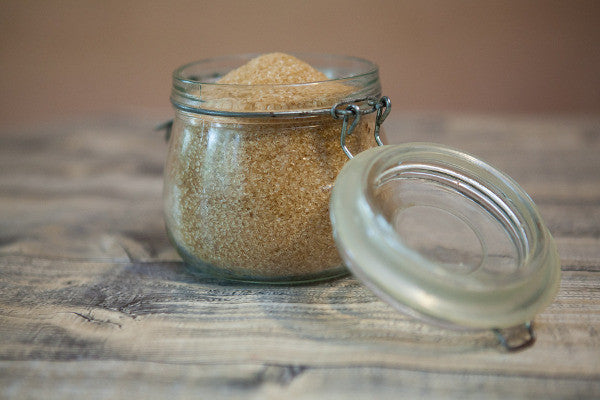
We all need just a little bit more sweetness in our lives. Now, before you bust out in your best rendition of “Pour Some Sugar on Me”, you should understand that sugar is not the best way to sweeten your food. Each day, science seems to be discovering more health problems that are caused by consuming too much sugar in your diet. Processed sugar is filled with calories that are very easily converted to fatty tissue. Also, sugar agitates the growth of bacteria on your teeth, leading to tooth decay.
Sugar has also been found to increase the risk of heart disease.
Science also has discovered issues with other artificial sweeteners such as aspartame, which has been linked to health issues, including possibly cancer. This is why many people have been turning to natural sweeteners, including erythritol. This sweet addition can be a more healthful option than most sweeteners on the market
What is Erythritol?
There are many different types of natural sweeteners available on the market such as stevia, xylitol, and sorbitol. However, we would like to discuss erythritol as a natural sweetener. It’s important to understand this sweetener and how it can be used in your diet. Let’s start with understanding what erythritol is and how it is made.
Erythritol is made from taking plant sugars from natural sources such as grapes, melons, pears, and other starches and plants. The plant sugars are then mixed with water and this mixture goes through the fermentation process with natural cultures. Once it is fermented, the erythritol is formed. The erythritol is then filtered and then it crystallizes and dried into granules. This natural sweetener is 70% as sweet as table sugar without the calories.
While erythritol is fermented and it is called a “sugar alcohol”, it is very different than what you think of when you think of the alcohol in alcoholic beverages. Its chemical structure is unlike the ethanol in alcoholic beverages, so you don’t need to worry about “getting turnt” when you used erythritol in any of your recipes.
What Are Some of the Benefits of Erythritol?
Now that you understand what erythritol is, it’s important to understand why erythritol is preferable as a sweetener. There are many benefits to erythritol in comparison to sugar and other sweeteners on the market.
Zero Calories
Erythritol contains zero calories, so you don’t need to feel guilty when you eat something sweet that has been made with it. Since it doesn’t have those calories, you don’t need to worry about burning them off or worry about gaining those pounds that you really don’t want to see on the scale.
Zero Carbohydrates
The problem with simple carbohydrates is that your digestive system is able to break them down very quickly to give you an immediate jolt of energy. This means that your body needs to burn these calories off quickly as well, otherwise they will quickly convert to fat in your body.
Zero Glycemic Index
Unlike sugar, erythritol has a zero glycemic index. This means that when you consume erythritol you will not see an affect blood sugar or insulin levels. This makes erythritol a great option for people who are on low-carb diets or people who are at risk of diabetes or are currently managing their diabetes. This way, people who normally would not be able to enjoy anything sweet are still able to satisfy their sweet tooth without needing to worry about how it would affect their blood sugar.
Does Not Cause Tooth Decay
Anyone who has been to the dentist knows how dangerous sugar can be for your teeth. Sugar agitates the growth of harmful bacteria on your teeth. This will encourage plaque buildup and will eventually lead to tooth decay and cavities. Erythritol does not cause this problem. Erythritol does not agitate the growth of bacteria on your teeth, so you never need to worry about having the similar tooth problems that will occur when you consume too much sugar.
Erythritol Compared to Other Natural Sweeteners
There are many different natural that you can choose from. Let’s take a look at some of the other sweeteners on the market and why erythritol might be the best choice in comparison.
Stevia
Stevia is a sweetener that is derived from the leaves of the Stevia plant. It can come in both granulated form as well as a liquid form. Similarly to erythritol, it has very few calories and it has very little effect on blood sugar levels, which makes it an excellent option for diabetics and people who are on low-carb diets. However, stevia’s largest drawback is its taste. While stevia is very sweet (even sweeter than sugar), stevia is known for having a bitter or licorice aftertaste, which can be very off-putting. Many people choose to blend erythritol with stevia, so you still get the delicious sweetness, but the bitter aftertaste is much more subdued.
Xylitol
Similar to erythritol, xylitol is a sugar alcohol. It is produced very similarly to erythritol, but it has a very different chemical composition to erythritol. Unlike stevia, it does not have the bitter aftertaste. However, some people have discovered that xylitol could cause dietary issues and it is not recommended for anyone who is struggling with irritable bowel syndrome.
Sorbitol
Sorbitol is another sugar alcohol with a different chemical composition than erythritol and xylitol. It has the same benefits as erythritol, but it has a much worse laxative effect than xylitol. Sorbitol has been found to be what causes the laxative effects in dried fruits such as prunes.
Unlike these natural sweeteners, erythritol has the benefits of these sweeteners without any of the drawbacks. This makes erythritol the best choice in comparison to most natural sweeteners on the market.

How to Use Erythritol in Your Diet
Erythritol is a perfect sugar substitute and can be used in baked goods and or anything that you would normally put table sugar in. However, you need to consider that erythritol is only about 70% as sweet as sugar, so you will need to add more erythritol to make it as sweet as you would normally want it to be. There are many recipes that are specifically made with erythritol instead of sugar. If you want to try using erythritol as a substitute, we would recommend starting with some of these recipes, such as our Low-Carb Chocolate Doughnuts or our Low-Carb Brownies. You can also just use it as an additive to coffee or smoothies. It will add that sweet little boost of sweetness that fulfills that craving.
Choosing Erythritol as a Natural Sweetener
When you are looking for the right type of erythritol as a sweetener, it is important that you choose an erythritol that has been made with organic, non-GMO fruits and starches. This will help to ensure that you are not getting any additional chemicals in your diet that will harm your body and undo any of the benefits that erythritol provides. Also, you need to be sure that the erythritol that you use is 100% pure erythritol without any artificial sweeteners such as aspartame have been blended into it.
If you are craving more sweetness in your diet, but you are trying to move away from processed sugar, try using erythritol as a natural substitute in your diet. Erythritol is the best choice to help you get that sweetness that you have been craving in your diet without worrying about all the calories and drawbacks of sugar.


